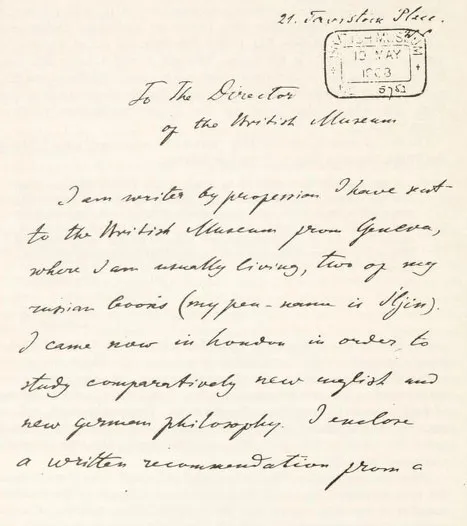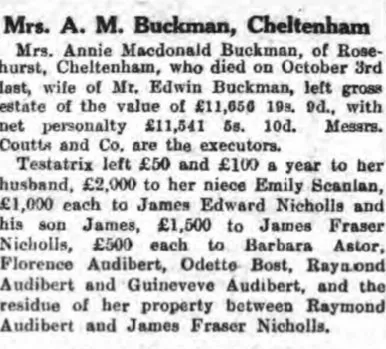21 Tavistock Place, St Pancras — 1908
In May 1908, Vladimir Ilyich Lenin arrives back in London carrying a written recommendation from Joseph J. Terrett in support of a request for entry into the British Museum Library. Sadly, on being unable to find a Joseph J. Terrett at the address provided on the reference, the museum’s admissions officer declines the recommendation and Lenin is forced to secure a second reference from Iskra printing-pal, Harry Quelch, a founding member of the Communist Party of Great Britain. This new recommendation is accepted and Lenin is issued with a three-month pass to the library. During his stay he writes to Camille Huysmans, a German-educated Belgian and member of the Belgische Werkliedenpartij (Belgian Labour Party). As of yet I have been unable to find the name of the property owner in May 1908. Kate Lee and Joseph Jenner appear at 22 and 23 Tavistock Place, whilst Emily Biller was at No.24.

At 21 Tavistock Place in 1911, some three years after Lenin’s stay in London was Russian barber, Bert Barnett and his family. This is quite amusing, as on earlier trips, Lenin and his companions in London had been meeting under the banner of ‘Foreign Barbers of London’, a pseudonym for the Bolsheviks most likely derived from similar working men’s associations active in Whitechapel’s at this time (Traitors Within, Herbert Fitch, 1933).

In the absence of a definite match for the property in 1908, I looked to earlier censuses and found French resident, Albin Audibert (b.1868) and his wife Adonia (b.1868) running a lodging house at 21 Tavistock Place in 1901. This is interesting, as subsequent to his stay at 21 Tavistock Place in 1908, Lenin relocates to the Panthéon district of Paris. In Paris, Lenin meets Inessa Armand, radical feminist Bolshevik married to Alexander Armand, son of a fabulously wealthy Russian textile merchant who had set up Sunday Schools for peasant children (an idea taken up by exiles in London’s East End a few years later). Lenin’s first address in Paris is 24 rue Beaunier. Its curious also to note that Lenin, a talented law-graduate was now within a short walk of Professor Audibert’s Faculte de Droit de L’Universite (law faculty) at place du Panthéon. Another famous Audibert was Auguste Audibert, editor of the earlier La Radical and La Caricature, the latter published in the wake of France’s July Revolution; contributors included Balzac. But as we don’t know for sure if Albin Auditbert was at 21 Tavistock at the time of Lenin’s visit in 1908, what follows may be little more than coincidence.
- Between 1901 & 1911 the Audibert’s move their lodging business from 21 Tavistock Place to 7 Tottenham Court Road. The house has seven guest rooms and is next door to a pub and a fish restaurant. The road and its pubs features prominently in Lenin folklore.
- The public house next door to the Audiberts was the Blue Posts tavern managed by William Perry and his wife Florence. William Thomas Fletcher Brown, a 57 year old law clerk living in St John at Hackney, appears as Perry’s partner on property records and lives just a few minutes around the corner from Lenin’s friend Theodore Rothstein at Clapton Square.
- In 1930, an Annie MacDonald Buckman left £500 and the residue of her property to Albin Auditbert’s son Raymond Audibert (Gloucester Journal, 22.11.1930).
- Annie Buckman was the wife of painter/engraver Edwin Buckman. Edwin had been tutor to Princess Alexandra, aunt of Kaiser Wilhelm II (see also: E. Buckman Dispensary in the East End of London 1871)
- Curiously in 1896, Edwin Buckman’s cousin, Katherine Julia Buckman was initiated into the Hermetic Order of the Golden Dawn at its Isis-Urania temple. The order, popular with left-wing radicals, had been greatly inspired by Russian philosopher (and suspected agent) Helena Blavatsky. During this same period, the Golden Dawn had its London headquarters at 62 Oakley Square, just a few hundred yards away from Lenin’s 1911 address, 6 Oakley Square.

Recommended reading:
Conspirator: Lenin in Exile – Helen Rappaport
The Spark That Lit the Revolution – Robert Henderson
Related Articles
Lenin at Holford Square
Lenin at Percy Circus